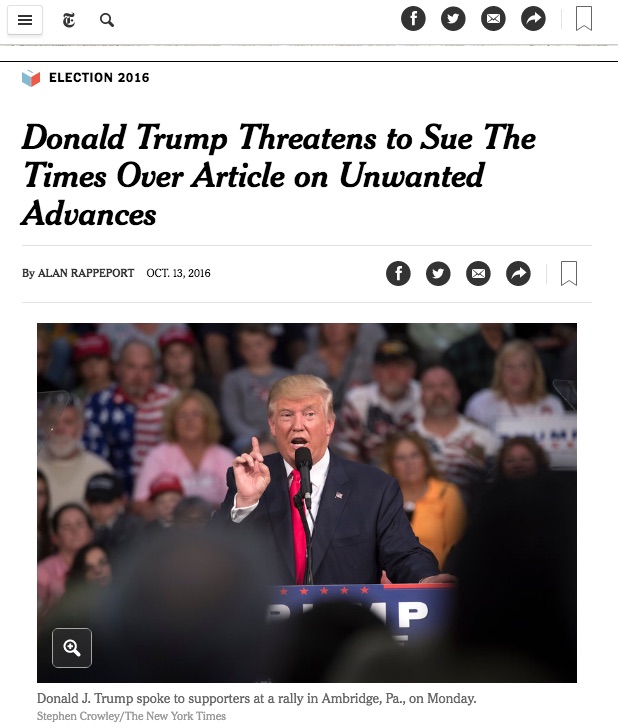The New York Times’ boldly effective response to Trump’s libel threats

The New York Times published an article about Trump sexually assaulting two women. Trump threatened to sue for libel. The letter that the Times‘ lawyer sent in response really hits you smack on the forehead, because it’s so different from anything else you read in the paper. I’ll analyze.
There are three kinds of things you read in the Times, or any newspaper. News articles and analysis feature a balanced and evenhanded tone and any first-person remarks are about what the reporter saw. Editorials feature the first-person “I” or “we,” but are clearly biased. Feature stories and reviews often include first-person narrative and opinions, but they’re about experiences, not journalism or politics.
David McCraw’s letter responding to Trump’s lawyer Marc Kasowitz breaks the mold, because McCraw is not a journalist. He’s a lawyer defending the Times. So the Times becomes a character in this drama, along with Trump. Let’s take a look. My comments are in brackets; where you see bold, I’ve added it to make a point. As usual, my translations are my own.
Re: Demand for Retraction
Dear Mr. Kasowitz:
I write in response to your letter of October 12, 2016 to Dean Baquet concerning your client Donald Trump, the Republican Party nominee for President of the United States. You write concerning our article “Two Women Say Donald Trump Touched Them Inappropriately” and label the article as “libel per se.” You ask that we “remove it from [our] website, and issue a full and immediate retraction and apology.” We decline to do
so.
[Note the use of “we” and “you,” — this is a letter directly from an organization to an individual. While all business writers should use these words, newspapers rarely do (outside of editorials). McCraw states the facts without bias first, then explains the paper’s position in a five-word sentence. Always state facts without anger; always be clear about your position.]
Translation: Go to hell.
The essence of a libel claim, of course, is the protection of one’s reputation. Mr. Trump has bragged about his non-consensual sexual touching of women. He has bragged about intruding on beauty pageant contestants in their dressing rooms. He acquiesced to a radio host’s request to discuss Mr. Trump’s own daughter as a “piece of ass.” Multiple women not mentioned in our article have publicly come forward to report on Mr. Trump’s unwanted advances. Nothing in our article has had the slightest effect on the reputation that Mr. Trump, through his own words and actions, has already created for himself.
[This is more powerful because it consists of facts about Trump’s own statements. All the sentences are in active voice. There is only one weasel word (slightest). Instead, McCraw makes his point with verbs like “bragged” and “acquiesced.” It’s devastating and logical, but not overstated. The stronger your case, the more directly, dispassionately, and factually you should make it.]
Translation: Trump has proven he’s a pig, so saying he’s a pig is not libel. You can’t tarnish what’s already corroded.
But there is a larger and much more important point here. The women quoted in our story spoke out on an issue of national importance — indeed, an issue that Mr. Trump himself discussed with the whole nation watching during Sunday night’s presidential debate. Our reporters diligently worked to confirm the women’s accounts. They provided readers with Mr. Trump’s response, including his forceful denial of the women’s reports. It would have been a disservice not just to our readers but to democracy itself to silence their voices. We did what the law allows: We published newsworthy information about a subject of deep public concern. If Mr. Trump disagrees, if he believes that American citizens had no right to hear what these women had to say and that the law of this country forces us and those who would dare to criticize him to stand silent or be punished, we welcome the opportunity to have a court set him straight.
[Now, with the facts related, McCraw takes a position. While a few weasel words (bolded) have crept in, again, the sentences are active and the statements feature “we.” “It would have been a disservice . . . to democracy itself to silence their voices” is a little over the top, but having stated your case, you get to do that. If you believe the Times does good work, you can cheer. If you think they’re out to get Trump, you can boo. But there’s no mistaking where McCraw is coming from.]
Translation: We did our jobs well. So go ahead, bring it on.
Lessons from this letter
You should write like this. (This may be the first time I’ve ever said that about a statement from a lawyer, but I’m not grading this on a curve.) Here’s what to learn:
- Write short. This is 340 words, but includes everything that’s needed. There’s no warmup, and no waste.
- State facts first, then opinions. Don’t come charging red-faced out of the gate; it undermines you.
- Use “we” and “you.” It makes your prose more direct and engaging.
- State facts and opinions in active voice. There is no passive in this letter. That means you can tell who’s doing what in each statement. McCraw talks about what Trump has done, what his lawyers have done, what the reporters have done, and what the paper has done. It’s all very clear and direct.
- Put important statements in short sentences. “We decline to do so.” Any questions?
Writing this way takes courage. Get some.

Thanks for laying this out succinctly. It’s really helpful to have you take a good example and lay out the features that make it good. That I cheer the NYT in this is a bonus, but the main thing is to learn why that letter struck such chord.
+1
Why are “slightest” or “diligently” weasel words? They seem to reinforce what is said, and each serves a real purpose.
The sentence with “slightest” in it appears to me to serve the purpose of denying that Trump has suffered any damage to his reputation. That has legal significance. As Chick Hearn would say, no harm, no foul.
What is weaselly about saying that the reporters did their job diligently? Either that sentence is a response to some accusation made by Trump’s lawyer or it anticipates and rejects in advance a claim that the reporters were sloppy or lazy or otherwise failed to meet the standards expected of reporters.
I may just not understand what a weasel word is. Kindly explain.
An excellent, clear, and interesting, analysis.
Weasel words are simply intensifiers and qualifiers that have no precise meaning. See:
https://bernoff.com/blog/how-to-fix-weasel-words
One or two weasel words are not a problem. It is the pileup that is the problem. Compare these two sentences, one that the author actually used, and one that he could have used:
Our reporters diligently worked to confirm the women’s accounts.
Our highly intelligent and heroic reporters diligently worked to confirm the women’s heinous and damning accounts.
The first is fine. The second strains credulity. The objective is to reduce the pileup of weasel words, not eliminate every single adjective and adverb that lack precision.
Thanks. Now I understand what you mean by “weasel words.” That’s different from my understanding that a weasel word is a word that lets the writer weasel out of a strong declarative statement and is intended to enable the writer to escape the consequences of having made a flat-out commitment. “I didn’t say you were a [fill in your own pejorative]. I said you might be or probably were a [same pejorative]. I allowed in my original statement that I might be wrong. So you would be unjustified if you hit me and pound me into the ground.”
–
Your advice on avoiding overuse of what you term weasel words seems wise. However, I think intensifiers aren’t weaselly. They just add to a strong declarative statement. I see why qualifiers would qualify as weaselly.
Your comment inspired me to write a whole post on it:
http://wobs.co/WeaWord
Thank you for dissecting and translating McCraw’s letter. Loved the lessons. K